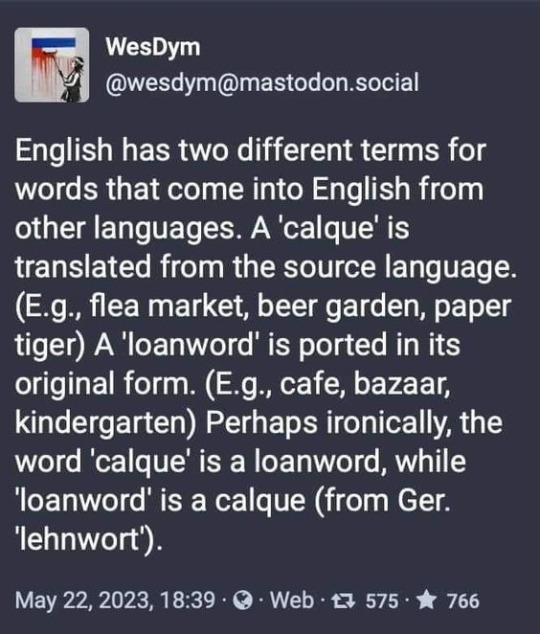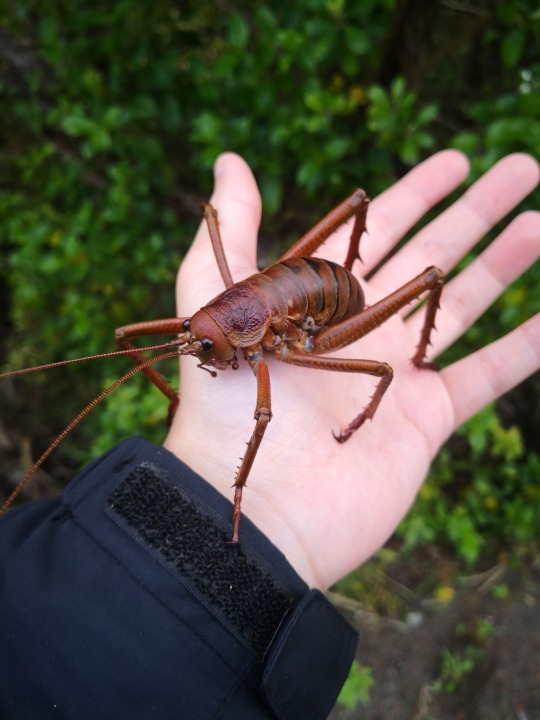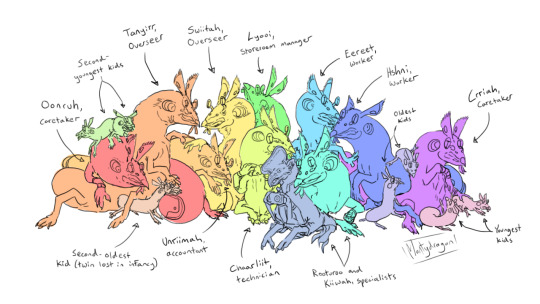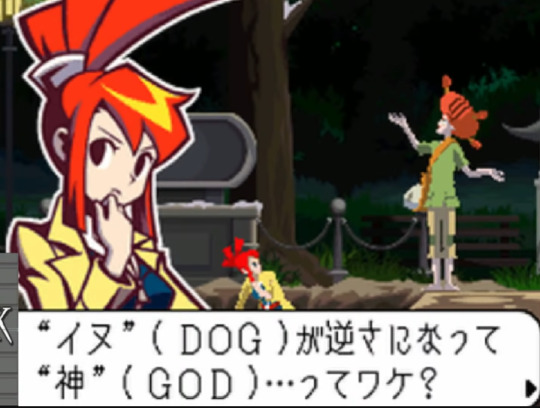#Loanword
Explore tagged Tumblr posts
Text
Calque & Loanword

Found this. Kind of want to share.
#Languages#English#Calque#Loanword#loanwords#etymology#lingblr#linguistics#language#english language#terminology#fun with languages#languages are weird#lehnwert#German#French#cafe#bazaar#kindergarten#flea market#beer garden#paper tiger
2K notes
·
View notes
Text
"Anime" got given back! Animation -> アニメーション→アニメ→ Anime
I love the term “loanwords” because it implies that you intend to give them back.
76K notes
·
View notes
Text

By ssw-burlg at iNaturalist, CC-BY-NC
#wētāpunga#little barrier giant wētā#giant wētā#giant weta#wētā#weta#cricket#bug#insect#arthropod#that's a lot of tags!! but it's spelled both with and without the macrons in english#wikipedia tells me spelling it with the macrons in english is becoming more common#because it's a Māori loanword#and if you spell it without the macrons it has a..... different definition#learned more than expected tonight when i decided “hmm. i want a really big bug”#sunday poll
149 notes
·
View notes
Text
calque being a loanword and loanword being a calque is something that just has to be mentioned more
#linguistics#lingblr#language#conlang#manic pixie dream girl#loanwords#calques#linguist humor#linguistique
303 notes
·
View notes
Text
biggest dumb pet peeve is when an anglophone reposts some text or video that's technically not in english but still uses a ton of english loanwords in addition to being a germanic or roman language, and captions it like 'wow truly this post transcends language boundaries, i was able to understand almost all of this' yeah the parts you understood were in english buddy
#not to say that nothing can ever be understood across language barriers#just annoying when that's not what's happening#like if i say#'wow in de trein vanmorgen was zo'n vibe. ik kon echt goed relaxen'#even if you don't speak dutch its not too hard to get the meaning... because i was using several english loanwords#and words that are either the same or only a few letters of#in a language that's extremely close to english grammatically as well#neat if you can understand it? sure! surprising or universal? ❌#joos yaps#delete later
176 notes
·
View notes
Text

Family portrait of an agrarian bugferret household, including their unofficially adopted avian (Rooturoo). By bugferret standards, the family is both small and strangely put together. More details under the cut!
This family manages a large farm in an avian/bugferret space station city. The current household makeup is relatively new. The oldest, Tanyirr, Swiitah, and Lyooi, are the last of the 'old guard'. The most recent member is Kiiwah, a spacer adopted after being divorced from a different family.
All the names displayed here are their nicknames given by Rooturoo. Most refer to avian homeplanet foods. The family in general speaks BFL-2 and Tiiliitian sign, so Rooturoo and Kiiwah are the only ones who speak vocal languages with any frequency.
Rooturoo occupies a very unusual space in the family. The bugferrets already ran a large portion of the avian agriculture in the city due to a governing quirk. Rooturoo originally helped out with the avian crops, being both suited to the ambient temperatures and an expert in xenobotany. Over time though... they became more than a colleague. They're now considered a member of the group.
The children are all very young. Their layer parents are Hshni, Oonruh, Uriimah, and Crriah (from oldest children to youngest). The rest of the ferrets are unrelated.
#runaway to the stars#rtts bug ferrets#rtts avians#rtts#rooturoo#kiiwah#note the gauge-style ear piercings all of them share#also Tanyirr and Swiitah are elders by bugferret standards!#they're 192 and 204 respectively#myart#tried to come up with convincing tiiliitian-style names for all of them#but Rooturoo was also raised in a Hotsuuv colony prior to this so there's probably loanwords from there too
112 notes
·
View notes
Photo

Tibeto-Burman-Munda loanwords in Nihali (via Korku)
50 notes
·
View notes
Text
me when ppl hc south italy as X percent arab when italians invaded colonized and committed massacres against north africans, going so far as to commit a genocide in libya:

#and i will be shot for this opinion#theres a whole bunch of other reasons but also: hima's random one-off “uhh he has ARABIC BLOOD” is also. hmmm#if we're pointing to before italy's a colonial power#the islamic rule in spain spanned 800 years#islamic rule in italy was only one island and for maybe 80-100 years#there is little to no lasting influence of this rule in italy except maybe a few loanwords#and regardless of the past it would be insanely inappropriate given the italian led genocide and destabilizations of libya#why are you so obsessed with making white countries nonwhite to some extent#it's really weird#hetalia#aph south italy#hws south italy#aph romano#hws romano
55 notes
·
View notes
Note
Hello! I'm sorry to bother you with this, but I have a question: At any point in mutant history, was there any mention of whether the Maximoff siblings can speak German? I've had that question stuck in my head all day.
Hey anon! You can bother me any time you like, no need to apologise. I like talking about this stuff. It's not like this question and others like it are remotely googleable either. I wish they were.

Obscure confirmation, though doppelganger has been an English loanword since the 1600s
Outside of the X-books I'm not the biggest expert on Maximoff history, except when Magneto shows up of course. To the best of my knowledge Pietro hasn't been shown speaking German on panel, though Wanda has once that I know of, in Excalibur #38, shown above. She knows at least that phrase and understood Kurt's question so I think we can take her at her word. I'd assume that would extend to Pietro too, but no confirmation.

They grew up in Transia (a fictional Balkan country) and have been shown speaking Romanian, which is the majority language there. Pietro has spoken Russian with some fluency before, and French for Wanda (I don't remember the issues sorry.) The Marvel wiki says that Hungarian, German and Symkarian are popular in Transia so it's not unlikely they speak or understand at least some of those languages, as well as Transian' depending on who you ask.
Wanda is a very accomplished magic user, so I'd assume she knows a fair amount of Latin, Asgardian runic and spoken language, and various other tongues with heavy magic association. Then again, I'm pretty sure she knows a spell that's basically a universal translator so she can be a true omniglot when required.
As I mentioned earlier, there's big gaps in my knowledge so if anyone knows more please chime in!
Hope that's helpful :)
#x comics#scarlet witch#quicksilver#wanda maximoff#pietro maximoff#kurt wagner#nightcrawler#German#linguistics#marvel#comics#magneto#transia#loanwords#excalibur
26 notes
·
View notes
Note
whats your opinion on old man yaoi?
Personally, I call it oyaji BL
#60 seconds till mission begins rambles#you made me laugh this is the only reason I'm answering this#linguistically old man yaoi is such an interesting word to me its the antithesis of a wasei eigo pseudo loanword#every time I see this word I giggle a bit
27 notes
·
View notes
Text
My favorite bit on that "how to pronounce dachshund" post is all the Germans who are cheerfully commenting, "I pronounce it dachs-hund, like it's spelled, hope that helps!" Sorry to say, but no it does not. If the spelling made it obvious, then we would not be having this discussion. Like I'm guessing it makes sense in German, but unfortunately in English there is no guaranteed pronunciation for any letter in that combination except the N and one of the D's. Proximity to other letters makes no promises. I can't even reliably compare sounds to other English words, because different accents will approach the vowels wildly differently, so I'm not entirely sure what my Australian and British friends are suggesting in their reblogs.
#spelling in English DOES have rules#but when it comes to loanwords we're not even consistent about keeping the rules of the previous language#I LOVE looking at how other languages handle plurals and then whether the English version follows suit
17 notes
·
View notes
Text

i was curious what the joke in japanese was since it fit so well in english (”you said rock of the g-o-d-s, but did you mean rock of the d-o-g-s?”) only to find out it’s literally the same joke english wordplay and all LMAO
#ghost trick#i guess 'dog' and 'god' are both well-known english loanwords in japan but lol#threw the translators a freebie#my nyas?
244 notes
·
View notes
Note
i've been pondering how mando'a-as-first-language speakers might tend to parse [θ] and [ð]... we know <x> = <sh> thanks to ryan kaufmann (which i'd say must be canon enough since traviss didn't contradict it) and [f ~ p] and [z ~ s] from Traviss, (and maybe <vh> = [f] at least dialectally a la Vhett -> Fett, but I'd prefer to think that's more a matter of Basic speakers parsing [ɸ] as [f] than [ɸ ~ f] being widespread in mando'a) but I don't think we have any data on how they'd tend to parse [θ] and [ð]. I like the idea of th-fronting where [θ] becomes [ɸ] and [ð] becomes [v ~ ʋ] (Kiwi English is allegedly developing this phenomenon), but since mando'a phonotactics don't seem to allow [ɸ] outside of a syllable-initial position (of course since vhe- words are the only example we have of <vh> the data is a biiit limited, but if we assume it's true) I do wonder how likely mando'ade would be to parse, for example, the [θ] in "cloth" as [ɸ], or if they'd be more likely to parse it as [t] or [s]. Tho I do also like the th-fronting bc I wanna distance <vh> from <f> as much as possible :') Not a cipher! 🗞️
On the other hand I'm a bit charmed by [θ] -> [s] as well, mostly bc I associate it with the Askie pronunciation of ת, historically [θ] which has in different regions either remained as such or become [t] (Modern Israeli) or [s] (Askenazi). But then the lack of [z] for [ð] (since [s] and [z] are not readily differentiated among mando'ade) makes it less ideal imo. I mean ofc they could be mismatchy, it's not like [ð] and [θ:] were replaced with other sounds neatly and evenly in Finnish (and there's that variation across dialects, which of course would be a thing among mando'ade as well--) But yeah, [ð] could be, if not [v ~ ʋ], then [d] or even [ɾ] or [l]... for obvious reasons I find the idea of the [ɾ] realisation pretty charming :')
anyway, uh, thoughts?
(yes i am thinking abt this bc loan words mostly)
(also. while generally i prefer [f] -> [p], ~kevhe [or whatever final vowel would be best...] for caf is much nicer than kep, lol...)
I’m afraid your ask is going to be better thought out than my answer!
I did think about the same thing, then thought about the option of ð being loaned as dh in Mando’a, and then got hung up in determining what the heck Mando’a phonology even is, and what do the dh etc. spellings stand for. And then never really got back to loanwords.
But now that I’ve found an answer that satisfies me, I do have a whole bunch of things I’d like to loan to Mando’a actually, because I for one don’t buy that a language of an empire, itself a creole (if you subscribe to that headcanon), does not have many loanwords. You know that joke about English mugging other languages and riffling through their pockets for loose vocabulary? I think it would be more realistic for people to make similar jokes about Mando’a, and how Mandalorians plundered half of the galaxy and half of the dictionaries too. (Yes, this is the hill someone else will die on.)
Anyways, yes I do have thoughts. Sorry this is going to be very long and rambling because these are more of immediate thoughts rather than something I’ve formed a considered opinion on.
Like you, I’ve also noted that vh only occurs in syllable initial position in the Mando’a dictionary. But! There’s a Mandalorian world called Ceravh, which as far as I can tell comes from Traviss. I’d give that even odds of being Mando’a or being (perhaps a Mandalorianised version of) a native name of the colonised world, which could indicate that Mando’a could use syllable-final vh in loanwords at least.
But anyways, another option I have thought about is that a word-final φ could get loaned as v. Even if Mando’a doesn’t allow a syllable final φ, the voiced counterpart v is very common in that position. So e.g. caf > kav. Or heck, how about h? > kah. Idk how sensible h would be, it just popped into my mind as something that could sound similar and is allowed in the coda.
Another option of course is that Mando’a could insert extra vowels into loanwords, like e.g. te reo Māori which basically keeps all of the original sounds and adds vowels until the word conforms to te reo phonotactics. So e.g. caf > kavha or kevhe or whatever the vowels would be. There’s this quote, which has a different context, but be used as a precedent if you wanted? “Pronouncing terminal consonants varies in songs. They often become extra syllables. For examples, tor becomes to-rah and tang becomes tan-gah to maintain rhythm and meter.”
On the other hand, loanwords, especially old ones, could also be subject to Mando’a’s habit of contraction. Which tbh seems as much fanon as canon to me in that canon shows some contraction and elision (especially in compound words), but fanon has observed that pattern and taken it as a licence to go an extra mile. I kind of love that kind of an emergency and it’s what got me interested in Mando’a in the first place. I digress, but I’m trying to say faithfully borrowing every single sound is not necessarily the way I’d go for Mando’a. Maybe borrowing syllables as the closest equivalents would feel better? Idk, maybe I’ll try a couple of different approaches with some test sets of loanwords and see what happens.
I do generally like f > p, but… Idk, the results don’t always compel me? They don’t sound unlike Mando’a, but also not exactly like Mando’a either? I mean kav feels more like Mando’a than kap to me. Same for vhervhek vs perpek (although for obvious reasons, perpek does appeal as a curse). But on the other hand, fan > pan vs van vs vhan? Not much of a difference. And Fi > Pai, Felucia > Pelucya/Pelusha, even Falleen > Palin/Paliin do sound good to me. This is probably because while there are words that end in p (like kotep, taap), they are pretty rare. While words ending in v or beginning with a p are a dime in a dozen.
I agree that Vhett being spelled as Fett is a transliteration from Mando’a to Basic, and not necessarily indicative of how Mando’a L1 speakers would adapt loanwords from Basic to Mando’a.
Re: θ/ð, I’ve previously considered t/dʰ, but I like both s and th-fronting better! Those would be the closest fricatives, wouldn’t they.
Mando’a doesn’t seem to have /z/, which seems to be an allophone of /ts/ rather than /s/, if you go by Traviss’s recordings. Or maybe it’s an allophone of /s/, if you go by some comments. Heck, maybe it depends on the dialect. So perhaps you could go with s/ts, or level them both as s? I guess it would depend on whether z gets loaned as ts or s?
Or go with th-fronting (θ > ɸ, ð > v) in syllable initial positions, and for the coda, either voice the θ > v, or add an extra vowel after it, or allow φ in the coda for loanwords. I think that at least for dialects that realise <v> as [β], th-fronting sounds really close. I like it!
And since some Mando’a dialects seem to have [b ~ v] (or perhaps more likely [v ~ β], or maybe some dialect has /β/ which is heard as /b/ in some others…), after making the rounds in Mando’a dialects, a loan word might even end up with ð > v > b.
Full disclosure, I also like how either would make loanwords a little less immediately recognisable. But on the other hand, loanword phonology is also affected by the speakers’ understanding of the donor language, which might bias e.g. /t/ over /s/. Idk though how much we need to nitpick realism in an artlang though. Enough to ground it, not so much the art goes out.
And then we of course have the loan words Traviss picked from English:
besom /ˈbiː.zəm/ > besom /ˈbɛ.sɔm/
Bergen /ˈbəɹɡn/ > birgaan /bɪɾ.ɡaːn/
TAB /tæb/ > taab /taːb/
hyem /jɛm/> yaim /ʝaɪ̯m/
charva /ˈt͡ʃɑːvə/ > chaav’la /ˈt͡ʃɑːv.la/
chebs /tʃɛbs/ > shebs /ʃɛbs/
scran /skɹan/ > skraan /skɾaːn/
scunner /ˈska.nɐ/ > skanah /ska.nah/
(Geordie) way aye /ˈwaɪ.eɪ/ or (Pompey) weee /wiː/ > wayii /wa.jiː/
dinny /ˈdɪ.nɪ/> dinii /dɪ.niː/
jack /d͡ʒæk/ > jag /d͡ʒaɡ/ ?
(I’m not counting mhi and kando from that linked post, since they—or at least kandosii—are pre-Traviss Mando’a.)
Bit of a guess at the pronunciations because I’m not a Geordie and Traviss doesn’t do IPA, but I’m getting the feeling that the vowel qualities don’t match up that well. I might have loaned Bergen as *bargen or *begen instead. Besom i > ɛ I can excuse as levelling the vowels to the same height, which seems like something Mando’a is prone to. ɛ > aɪ̯ is interesting. But generally, I’m not sure what I’m looking at here? Maybe just artistic licence?
Of course if actual historical loans, we’d have to consider that those words might’ve been loaned from a dialect or at a time when the pronunciation differed from modern/RP pronunciation. Plus I at least like to think that Mando’a itself has many different dialects, so I’d be willing to excuse a degree of artistic licence and inconsistency, especially when it comes to vowels which are more fluid to begin with. Afaik it’s also not weird for natural languages to exhibit even considerable variation in loan word adaptation.
Ch is loaned both as ch and sh. Syllable-final r seems infrequently loaned (birgaan) or not (chaav’la) or loaned as h (skanah)—perhaps this reflects the (non)rhoticity of the dialect from which the loans came from, because Mando’a does have syllable-final r’s. Otherwise the consonants in these words seem unremarkable.
Talking about r though, I think there are some words in Mando’a where n > r in certain environments (or at least that could explain some etymologies). I guess it wouldn’t be too much a stretch to extend that to d and maybe ð. You can hear [kote], [kode] and [koɾe] or the Republic Commando OST. Imo this is simply the effect of singing on pronunciation (I was a trained singer once upon a time, I could go on about this), but Traviss seems to have taken it as t and d being interchangeable, or /kode/ being the archaic pronunciation and /kote/ modern.
Also as an aside, I kinda want to work out the phonetics of Huttese, because clearly Huttese (or trade/pidgin/creole Huttese, whatever they speak as a lingua franca in the Outer Rim) has lots of Basic loanwords, and I think that many Basic loanwords would probably arrive to Mando’a via Huttese rather than directly from Basic.
tldr: You have seem to have thought more about this than me. Do you have more thoughts? I’m not sure how much sense my reply made; it was bit of a brain vomit. I’ll probably go read some things and come back to this later with hopefully more sense, but I wanted to reply now because I’m not sure how busy I’ll be in the near future.
P.s. you wouldn’t happen to remember where you read about <x> = <sh>, [f ~ p] and [s ~ z]? I mean I remember reading some of those same things, but it was at least a year ago and I don’t seem to have saved the source (whoops). I can probably look up the source myself if you remember where it was. Might it have been this forum thread? “So, Xaga might have been "Shaga" (incorporating that "sh" sound the Mando like) and Zuka could've been Suka.”
#mando’a#mandoa#mando'a#mando’a language#mando’a phonology#loanwords#mando’a loanwords#loanword phonology#conlanging#conlang problems#conlang#mando’a linguistics
21 notes
·
View notes
Text
writing a business email in a language you mostly use casually, 4 dead dozens injured,
#normal office chat? fine. giving a presentation? I have enough of an accent that most phrasing eccentricities will be forgiven.#but writing an email specifically fucks with me like. is this the right opening. is this the right signoff. is this enough small talk.#is there a formulaic phrasing i simply do not know. have i accidentally said the equivalent of 'per my previous email'.#is it okay to loanword in this technical term the way I would in conversation or do I have to look up what the official tl is#professional etiquette is its own dialect in any language and never do I feel as much like an impostor as when I stare at that email cursor#a day in the life of lia#random workblogging
15 notes
·
View notes
Text

you are already booped
#boop#boopocalypse 2024#hokuto no ken#fist of the north star#i don't remember which of those i used for the tag but i'm pretty sure i have one? god...whatever have this and enjoy lmfao#friend suggested お前はもうブーップンでいる but i think it'd be お前はもうブーップている just bc i think it sounds more right?#but conjugating loanwords ain't my strong suit. gave me a laugh anyway. ahhhhh best april fools in years if not ever
79 notes
·
View notes
Note
Okay, I've got a language question for you:
Why would native Thai speakers accentuate (as they seem to) the last syllable of English-language nouns, proper and common ? Is there something in their own tongue that would have led to this practice ?
Isn't it the best thing ever?
My favorites are strawberry & blueberry.
sounds like
sa-tawh-bur-rEEE boo-bur-rEEE
Okay, so the first thing is, mostly in Thai, consonant noises don't exist without vowel noises attached.
The easiest way to think about this is the name Sky (think about it particularly in SCOY, but also LITA). The S+K can't really exist together, they need a ahh vowel noise to break them.

The way it's said in Thai is:
Sah'kai
Remember that?
The ' indicates a glottal stop (slight hitch in speaking). You have to kind of stop the breath from the "sah" by rolling your tongue up towards the roof of your mouth to then say the hard "k." If you know how to say the formal sah'wah dEE, you'll know how to execute that. And that's because sk can't really be said together in Thai.
To answer your question, it depends on the sound the loanword converts into for Thai comprehension/execution.
For example: "bur" is an adapted loanword (from the English for "phone number") but they actually drop tone the end of that word. Which may sound, to English speakers, like a de-emphasis. In fact "bur" shows up all the time in BL but most English speakers don't realize it's a loaner. See UWMA Dean getting Pharm's digits.

What you're picking up on is most likely the ah and ee sounds, which in Thai are often tonally pushed up in loanwords. It's not really emphasis as we think of it - it's the use of a non-tonal word in a tonal language. Those sounds are simply said that way when they are placed in those parts of words in Thai.
Like, how some people have a really hard time rolling their rr's. Or pronouncing the ø. Or the w (many native Mandarin speakers will say it as a v).
It's the way those sounds are shaped in the mouth in that part of the world.
Language trains the human brain so there are also some sounds it's very hard for speakers of a different language to even hear. I really struggle with some Thai tones, myself.
72 notes
·
View notes